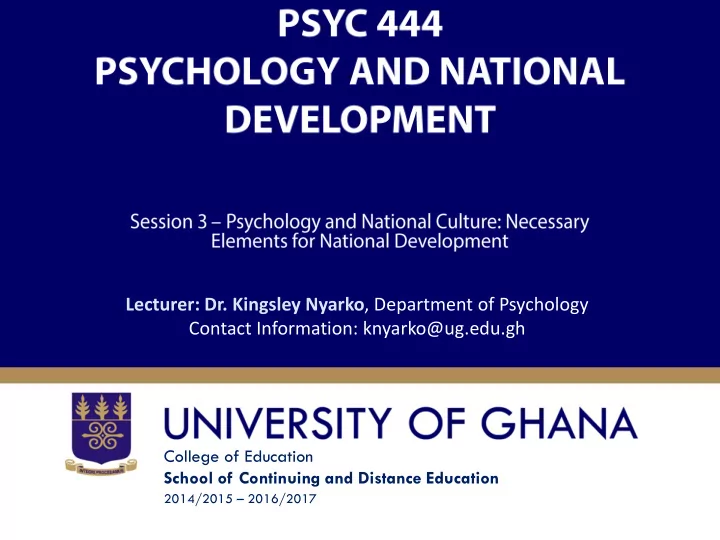

Lecturer: Dr. Kingsley Nyarko , Department of Psychology Contact Information: knyarko@ug.edu.gh College of Education School of Continuing and Distance Education 2014/2015 – 2016/2017
Session Overview At the end of the session, the student will be able to • Evaluate the relevance of culture to national development. • Acquire values the promote national cultural consciousness. • Discuss the relationship between psychology and culture in shaping national development. Slide 2
Session Outline The key topics to be covered in the session are as follows: • A Look at Culture • Culture as an Element in National Development • Psychology’s Role Slide 3
Reading List • Adair, J. G. (1999). Indigenization of Psychology: The Concept and its Practical Implementation . Applied Psychology: An International Review, 48 (4), 403 – 418 • Dyasi, H.M (1985). Culture and the Environment in Ghana . Environmental Management, 9(2), 97-103. Slide 4
Topic One A LOOK AT CULTURE Slide 5
A look at Culture • Observations: – Sir Edward Taylor, English anthropologist, 1832-1917 • “Knowledge, belief, art, morals, law, custom, and any other capabilities and habits acquired by man as a member of society” – UNESCO 2002: • “A set of distinctive spiritual, material, intellectual and emotional features of society or a social group” and includes art and literature, lifestyles, ways of living together, value systems, traditions and beliefs – Geert Hofstede: • Collective programming of the mind Slide 6
A look at Culture • Acquired knowledge that people use to filter life experiences and to generate social behavior. It is: • Learned • Shared • Cumulative • Symbolic • Integrated • Dynamic Slide 7
Sample Questions • Evaluate the relationship between psychology and culture in shaping national development. • How does psychology play a role in shaping cultural awareness? Slide 8
Topic Two CULTURE AS AN ELEMENT IN NATIONAL DEVELOPMENT Slide 9
Culture as an Element in National Development • Ignoring culture is like ignoring the role of norms and standards in national development. • Culture influences behaviour. • Behaviour needs to be shaped to get desirable results, such as national development. • Psychology studies behaviour and behaviour modification. • Psychology appreciates individual differences. Slide 10
Culture as an Element in National Development • Sinha (1997) agreed that there was confusion about meaning, National cultural values are – learned early , (good to start from childhood) – held deeply and – They change slowly over the course of generations. Slide 11
Topic Three PSYCHOLOGY’S ROLE Slide 12
Psychology’s Role • What can Psychology Do??!!?? – Learning, Changing behaviours and attitudes • Human Growth and Development? – Psycho-social Development – Autonomy, independence, competence etc • Adolescent Development. • Cross-cultural psychology Slide 13
Psychology’s Role • National development should be seen as a process, and can come about by looking at strategies that develop the individuals and various institutions within the nation – Political institutions – Production of goods/services – Civic responsibilities – ICT and innovation – Attitudes towards work • All these can be changed and shaped deliberately to achieve desired national devt Slide 14
Psychology’s Role • Institutional transformation/Change & Culture • For instance, institutional change: 1. alters the culture of the institution by changing select underlying assumptions and institutional behaviors, processes, and products; 2. is deep and pervasive, affecting the whole institution; 3. is intentional; and 4. occurs over time. Slide 15
Psychology’s Role • Culture is important in institutional transformation – along some aspects of the change process: • 1) readiness for, and responsiveness to, institutional transformation. – Psychologists engage in readiness creation, to get acceptance of change by individuals. • 2) resistance to planned change. – Psychologists engage in managing resistance to change. Slide 16
Psychology’s Role • Culture and behaviour are related – Change one, and you can succeed in changing the other! • Use Behaviour modification techniques through learning principles – Attitude change can result in engaging in behaviours that lead to national development. • Patriotism, citizenship behaviours, civic responsibilities, etc Slide 17
References • XXXXXXXXXXXXXXXXXXXXXXXXXX Slide 18
Recommend
More recommend